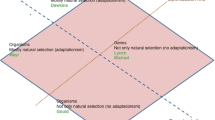Abstract
This paper uses the framework of Formal Darwinism (FD) to evaluate organism-centric critiques of the Modern Synthesis (MS). The first section argues that the FD project reconciles two kinds of selective explanations in biology. Thus it is not correct to say that the MS neglects organisms—instead, it explains organisms’ design, as argued in the second section. In the third section I employ a concept of the organism derived from Kant that has two aspects: the parts presupposing the whole, and the productivity of the parts in relation to the whole. The first aspect corresponds to the “design” that FD explains, whereas the second aspect is something about which the MS is largely silent.
Similar content being viewed by others
References
Bateson P (2005) The return of the whole organism. J Biosci 30(1):31–39
Burian R (2005) On Conflicts between Genetic and Developmental Viewpoints – and Their Attempted Resolution in Molecular Biology. The epistemology of development, evolution and genetics. Cambridge University Press, Cambridge, pp 210–233
Carroll S (2005) Endless forms most beautiful. WW Norton, New York
Chaitin G (1970) On the difficulty of computation. EEE Transac Inf Theory IT-16: 5–9
Cuvier (1812). Recherches sur les ossements fossiles des quadrupèdes
Darwin C (1862) On the various contrivances by which British and foreign orchids are fertilised by insects, and on the good effects of intercrossing. John Murray, London
Dennett D (1995) Darwin’s dangerous idea. Penguin, London
Endler J (1986) Natural selection in the wild. Princeton University Press, Princeton
Gilbert SF, Sarkar S (2000) Embracing complexity: organicism for the twenty-first century. Dev Dyn 219:1–9
Gould SJ, Lewontin R (1978) The spandrels of san Marco and the panglossian paradigm: a critique of the adaptationist programme. Proc Roy Soc Lond B205:581–598
Grafen A (1999) Formal Darwinism, the individual-as-maximising-agent analogy, and bet-hedging. Proc R Soc Ser B 266:799–803
Grafen A (2002) A first formal link between the price equation and an optimisation program. J Theor Biol 217:75–91
Grafen A (2006) Optimization of inclusive fitness. J Theor Biol 238:541–563
Huneman P (2010) Assessing the prospects for a return of organisms in evolutionary biology. Hist Philos Life Sci, 32, 2/3: 341–372
Huxley J (1942) Evolution: the modern synthesis. London: Allen & Unwin
Jablonka E, Lamb M (2005) Evolution in four dimensions. MIT Press, Cambridge
Kant I (1987) Critique of judgment. Trans. W. Pluhar. Indianapolis, Hackett
Mayr E (1959) Where are we? Cold Spring Harb Symp Quant Biol 24:1–14
Müller G, Newman S (2005) The innovation triad: an evo-devo agenda. J Exp Zoo 304 B(6):487–503
Odling-Smee J, Laland K, Feldman M (2003) Niche construction. The neglected process in evolution. Princeton University Press, Princeton
Oyama S, Griffiths PE, Gray RD (2001) Cycles of contingency. MIT Press, Cambridge MA
Pigliucci M, Muller G (2010) The extended synthesis. MIT Press, Cambridge MA
Skyrms B (1995) Evolution of the social contract. Oxford University Press, Oxford
Sober E (1998) Three differences between deliberation and evolution. In: Danielson P (ed) Modeling rationality, morality, and evolution. Oxford University Press, Oxford, pp 408–422
Wagner A, Wright J (2007) Alternative routes and mutational robustness in complex regulatory networks. Biosystems 88:163–172
Walsh D (2006) Organisms as natural purposes: the contemporary evolutionary perspective. Stud Hist Philos Biol Biomed Sci 37(4):771–791
West-Eberhard MJ (2003) Developmental plasticity and evolution. Oxford University Press, Oxford
Acknowledgments
The author warmly thanks an anonymous reviewer, and Samir Okasha, who provided invaluable constructive comments on the manuscript.
Author information
Authors and Affiliations
Corresponding author
Rights and permissions
About this article
Cite this article
Huneman, P. Formal Darwinism as a tool for understanding the status of organisms in evolutionary biology. Biol Philos 29, 271–279 (2014). https://doi.org/10.1007/s10539-013-9419-6
Accepted:
Published:
Issue Date:
DOI: https://doi.org/10.1007/s10539-013-9419-6




